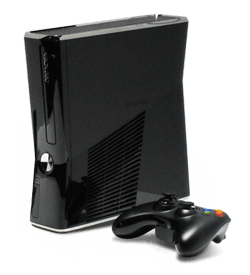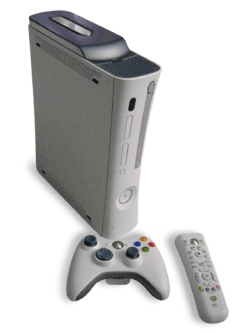Xbox 360
Jump In.
After four years, Microsoft's contract with NVIDIA on the Original Xbox was up. Their solution: release the Xbox 360 a year ahead of Sony and Nintendo's consoles. The 360 featured a continuation of the Xbox Live service with improvements over the original. The system itself continued to be Direct X-based like its predecessor, thus it was still relatively easy to port games from PC. This was greatly aided by Microsoft's developer tools; said tools have been praised by, among others, John Carmack of Id Software as the best development environment he's ever seen on a console, which helped mitigate the change of CPU architectures from an X86 Out-Of-Order CPU (very much like that in a PC) to a POWER-architecture based In-Order CPU (which requires more careful programming). The 360 continued what the original Xbox's trend with one difference: it finally began outselling Sony's console. As a result, the 360 began getting more exclusive titles as well as securing many of the third-party franchises that were once glued to PlayStation consoles. Microsoft was beating Sony so badly in the Console Wars early on that, for a while, their primary competition came from Nintendo's unexpectedly successful Wii.
As of the end of 2008, the 360 was in second place behind the Wii and still comfortably in the lead over the PS3 in most regions (apart from Japan, where its more modest sales are blamed on a lack of exclusive content aimed at Japanese games). That lead has narrowed since its initial release, while Microsoft has stopped dropping prices in favor of upgrading hard drive sizes and bundling additional software and features. The 360's business model in general relies on selling consoles at a loss (although, unlike the original Xbox, the 360 console has turned the corner into profitabilty) while making money on accessories and DLC. Online purchases are priced in "Microsoft Points," which allows users to make purchases without a credit card while reducing the credit card transaction fees Microsoft would otherwise have to pay.
Microsoft did have to take a few shortcuts to keep their system in a reasonable price range, including a cooling system that proved inadequate and a CPU that's a slightly modified version of the PlayStation 3's Cell Processor PPE architecture, though limited to a 10 MB frame buffer. There were widespread reports of "Red Rings of Death" (i.e. general system failure) errors causing consoles to die abruptly, particularly in earlier hardware revisions of the console where the excess heat would cause the solder to melt and then set incorrectly as it cooled. In the end, Microsoft reported that more than half (51.4%) of all 360 systems were affected by the defects, and ultimately took the step of extending the 360's warranty to cover all general system failure issues for three years, at the cost of $3 billion.
The "Red Ring of Death" issue gradually subsided thanks to improved hardware, and a major firmware update (the "New Xbox Experience", or NXE) has revamped the user interface and brought new features, such as Netflix integration and the ability to install games to the system's hard drive (although you still need to have the DVD in the tray to play the game, and some older games that cache their data on the hard drive anyway might not experience an increase in speed).
Xbox Live, the online component, has been praised for its large community and user-friendly friend management and game launching interface, and there's a large variety of content on offer for download. On the other hand, much of the multiplayer base has been characterized as juvenile and unfriendly and there's a relative dearth of free downloadable content, with the multiplayer service itself requiring a Gold membership unless a particular game (such as EA sports games) has its own subscription service.
System region locking is an optional feature for publishers. It's possible, though difficult, to change a console's region, but fortunately most games are published region free, Electronic Arts products and many Japanese releases being the notable exceptions.
Despite the usual 5-6 years of active life for a console, Microsoft has said that they have no plans to discontinue the 360 and expect it to remain on the market at least until 2015.

A new hardware redesign, officially dubbed Xbox 360S or Slim ("Valhalla" by its internal codename) premiered in the Summer 2010. The motherboard was streamlined further, even compared to the recent "Jasper" version, with the chipset shrinking to the just two chips (CPU, GPU and RAM all-in-one, made possible since they're now made by 45 nm process instead of original 90 nm), which greatly reduced costs and improved cooling. It also allowed the company to make the 250 GB HDD, encountered before only on the expensive Super Elite series, a standard equipment, and install it inside the case itself rather than the outside cab. WiFi is now standard, inside-the-case equipment as well, while the console's outer dimensions were significantly reduced; it now has a much more aggressive design, reminiscent of a cross between an original Xbox and PlayStation 2.
Although the RROD problem seems to have abated with the release of both the Jasper chip and the 360S (which, at any rate, now uses a blinking red light and onscreen error display rather than the traditional rings), the lightweight design has led to disc scratching, particularly if the console is picked up, moved or shaken while a game is running, becoming a more significant problem.
Autumn 2010 saw the release of the Xbox 360's most significant peripheral: Xbox 360. Formerly dubbed "Project Natal," Kinect is essentially a camera capable of tracking players' positions with a high degree of accuracy, allowing controller-free gaming and menu navigation. This has paved the way for a series of experimental, family-friendly games, while some enterprising users have discovered other, surprisingly awesome applications for the technology.
It's interesting to note that unlike most other consoles, Microsoft is not afraid to radically update the console's OS from time to time in order to allow room for more content and keep the experience fresh. It's worth noting Microsoft's background as a software company (as opposed to a consumer electronics company like Sony) as the primary motivation for doing so. The original blade interface was scrapped in 2008 with the release of the NXE or New Xbox Experience based off the "Twist" UI used in Windows Media Center and Zune players of the time. The release of Kinect in 2010 saw a revised version of the NXE based off Microsoft's then-relatively new "Metro" design standard, although for the most part was functionally unchanged save for the addition of the Kinect hub. The fall 2011 update now features the second major overhaul, expanding on the Metro concept and keeping it consistent with that of Windows Phone and the upcoming Windows 8. It also has the functional advantage of being able to navigate with either controller or Kinect in the same UI, and adds a new search function powered by Bing for more easily finding game and video content from the ever growing list of providers.
For the Xbox 360's online video game store, see Xbox Live Arcade.
List of games:
Exclusive to Xbox 360:
- Ace Combat 6 Fires of Liberation
- Akai Katana Shin
- Banjo-Kazooie: Nuts & Bolts
- Blue Dragon
- Bullet Witch
- Chrome Hounds
- Crackdown
- Death Smiles IIX
- Earth Defense Force 2017
- Forza Motorsport 2, 3, and 4.
- Gears of War 2
- Guilty Gear 2 Overture
- Halo:
- Halo 3
- Halo Wars
- Halo 3 ODST
- Halo: Reach
- Halo: Combat Evolved Anniversary
- Halo 4
- Kameo: Elements of Power
- Lost Odyssey
- Morph X
- Nin 2 Jump
- Perfect Dark Zero
- Senko no Ronde (as WarTech: Senko no Ronde in North America and Europe)
- Strania the Stella Machina
- Tenchu Z
- Too Human
Exclusive to Xbox 360 and PC:
- Alan Wake
- Battle Stations Midway
- Fable
- Gears of War
- Quake 4
- Left 4 Dead
- Mass Effect
- Metro 2033
- Monster Hunter Frontier
- Risen
- Shadowrun
- Splinter Cell Conviction
Multiplatform games:
- Ace Combat: Assault Horizon
- Alpha Protocol
- Anarchy Reigns
- Arcania: A Gothic Tale
- Armored Core 4
- Assassin's Creed I
- Asura's Wrath
- Backyard Sports
- Batman: Arkham Asylum
- Battlefield: Bad Company 1 & 2
- Battlefield 1943
- Battlefield 3
- Bionic Commando
- BioShock
- Binary Domain
- BlazBlue
- Blood Drive
- Blur
- Brutal Legend
- Call of Duty
- Modern Warfare
- World At War
- Call of Duty Black Ops
- Call of Duty Black Ops 2
- Call of Juarez
- Castlevania: Harmony of Despair
- Catherine
- Child of Eden
- Damnation
- Dantes Inferno
- Darksiders
- Dark Souls
- Deadly Premonition
- Dead Rising
- Dead Rising 2
- Dead Rising 2: Off the Record
- Dead Space series
- Death Smiles
- Devil May Cry 4
- DmC: Devil May Cry
- DoDonPachi Dai Fukkatsu
- Dragon Age: Origins
- Duke Nukem Forever
- Dynasty Warriors
- Earth Defense Force Insect Armageddon
- The Elder Scrolls IV: Oblivion
- The Elder Scrolls V: Skyrim
- El Shaddai: Ascension of the Metatron
- Enslaved Odyssey to The West
- Espgaluda II
- Eternal Sonata
- Fallout:
- Final Fantasy XIII
- FlatOut: Ultimate Carnage
- Ghostbusters the Video Game
- The Godfather: The Game
- Grand Theft Auto IV
- Grand Theft Auto V
- Gun
- Half-Life 2 (Part of The Orange Box)
- Homefront
- Hunted the Demons Forge
- Just Cause
- Ketsui: Kizuna Jigoku Tachi
- Kingdoms of Amalur: Reckoning
- Knight's Contract
- Lollipop Chainsaw
- Marvel vs. Capcom 3: Fate Of Two Worlds
- Ultimate Marvel vs. Capcom 3
- Mass Effect series
- Metal Gear Solid HD Collection [1]
- Mirror's Edge
- Mortal Kombat vs. DC Universe
- Mortal Kombat 9
- Muchi Muchi Pork
- Mushihime-sama Futari
- Naruto Shippuden Ultimate Ninja Storm 2
- Naruto Shippuden Ultimate Ninja Storm Generations
- Naughty Bear
- NHL Hockey
- NHL 08
- NHL 09
- NHL 10
- NHL 11
- NHL 12
- Nicktoons MLB
- Nie R
- Ninja Gaiden II
- Ninja Gaiden III
- Operation Flashpoint - Codemasters
- Overlord
- Persona 4 Arena
- Pink Sweets
- Portal (Part of The Orange Box)
- Prince of Persia (2008)
- Prototype
- Raven Squad Operation Hidden Dagger
- Rayman Origins
- Red Dead Redemption
- Resident Evil 5
- Rock Band
- Saints Row
- Sega Superstars
- Shadows of the Damned
- Silent Hill Homecoming
- The Simpsons Game
- Skullgirls
- Skylanders Spyros Adventure
- Sonic Generations
- |Sonic the Hedgehog 2006
- Sonic Unleashed
- Spider-Man Friend or Foe
- Spider Man Web of Shadows
- Spider Man Shattered Dimensions
- SSX
- Star Ocean: The Last Hope
- Street Fighter IV
- Street Fighter X Tekken
- Soul Calibur IV
- Soul Calibur V
- Super Robot Wars XO
- Syndicate
- Tales of Vesperia
- Team Fortress 2 (Part of The Orange Box)
- The Idolmaster and its sequels
- Unreal Tournament III
- Vanquish
- Watch Dogs
Special Versions / Remakes for Xbox Live Arcade:
- Beyond Good and Evil HD
- Bionic Commando Rearmed
- Guwange
- Heavy Weapon: Atomic Tank
- Ikaruga
- Lumines Live
- Radiant Silvergun
- Rayman 3 HD
- RayStorm HD
- Resident Evil 4 HD
- Rez
Kinect Games:
- Child of Eden
- Dance Central
- Dance Masters
- Dance Paradise
- Fruit Ninja
- The Gunstringer
- Kinectimals
- Kinect Adventures
- Kinect Sports
- Rise of Nightmares
- Sonic Free Riders
- Snowboard Misfits
